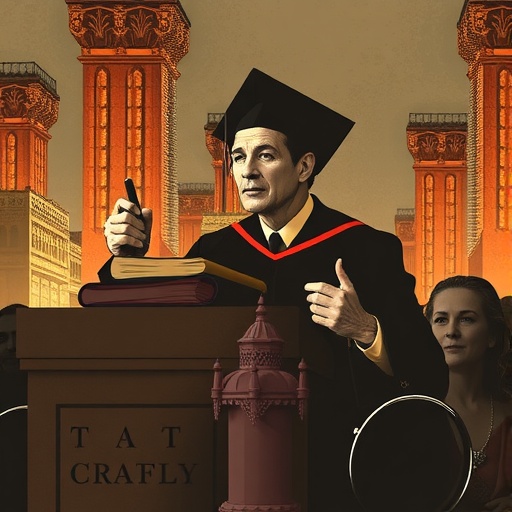In a time characterized by increasing polarization and misinformation, the role of faculty members in propagating conspiracy theories has emerged as a pressing concern in academic institutions. Researchers Siegel, Troxler, and Daumiller’s recent study titled “We don’t need no thought control”: dealing with faculty members spreading conspiracy theories, seeks to illuminate this intricate issue. The study sheds light on the implications for academic integrity, teaching effectiveness, and the overall intellectual environment within higher education institutions.
The study begins by contextualizing the escalation of conspiracy theories, which have gained traction in recent years, particularly during significant global events such as the COVID-19 pandemic and political upheavals. Faculty members, traditionally seen as bastions of knowledge and critical thinking, have, in certain cases, fallen prey to the allure of these conspiracy theories. This unexpected behavior raises questions about the fundamental principles of academia, including the pursuit of truth, evidence-based reasoning, and the responsibility educators hold in shaping the critical thinking of their students.
At the core of this inquiry is the acknowledgment that faculty members are not immune to cognitive biases or societal influences that can warp their judgment. The researchers emphasize that even individuals deeply embedded in academic environments can succumb to the siren call of unfounded beliefs. The phenomenon of ‘illusory truth,’ where repeated exposure to misinformation makes it appear more credible, is illustrated prominently throughout the study. This aspect often clouds even the most rigorous academic minds, leading to the inadvertent spread of unverified claims within the classroom and beyond.
Moreover, the researchers delve into the implications of such behavior on student perceptions. When educators espouse conspiracy theories, it shifts the focus from critical inquiry to an acceptance of unverifiable narratives. This not only undermines the professor-student dynamic but may also normalize a culture of skepticism that can extend to legitimate scientific discourse. In essence, students may become confused about which sources are credible and which are not, fostering an environment rife with confusion rather than clarity.
An essential aspect of the study is the proposed framework for confronting this challenge. The researchers advocate for proactive measures to address the dissemination of conspiracy theories among faculty members. They argue that it is vital for institutions to foster a culture of transparency and open dialogue where such issues can be discussed openly without fear of ostracization. Conducting regular workshops that educate faculty on cognitive biases and the responsible communication of information could prove effective.
The importance of institutional guidelines cannot be understated. Siegel, Troxler, and Daumiller suggest that universities should create clear policies that delineate the boundaries between academic freedom and the verified dissemination of information. When faculty members violate these guidelines by propagating conspiracy theories, institutions must respond with appropriate actions that align with their commitment to uphold academic integrity.
Engaging with the broader community is another key component of addressing this issue. Faculty members should not merely exist in isolated academic bubbles but instead actively participate in public discourse. By doing so, they can help demystify complex topics and stand against misinformation in a collaborative manner. The authors stress that a united front against conspiracy theories can bolster the credibility of academic institutions and promote a fact-based narrative in public discussions.
Additionally, the study emphasizes the need for faculty self-reflection. Educators should regularly evaluate their beliefs and the sources of their information. Incorporating practices of skepticism and critical evaluation into their pedagogical approaches can serve as an antidote against the allure of conspiracy theories. Encouraging students to question the origins of information is a valuable educational tool that fosters critical thinking skills essential in today’s society.
Ultimately, the researchers propose that dealing with conspiracy theories in academia offers a unique teaching opportunity. Instead of avoiding such topics, faculty can engage students in discussions about misinformation, media literacy, and the scientific method. By addressing these challenges head-on, academics can cultivate an environment where inquiry thrives, and students emerge more informed and discerning citizens.
As the study concludes, it reiterates the protective role academic institutions play against misinformation and intellectual complacency. Investing in a culture that challenges conspiracy theories can lead to a more empowered classroom dynamic, where evidence reigns supreme over conjecture. It is a call to action for all academics to recognize their influential positions and the responsibilities that accompany them in navigating the murky waters of unverified information.
In a world increasingly confronted by misinformation, fostering a strong academic stance against conspiracy theories remains more critical than ever. The implications of such beliefs reach far beyond the classroom and seep into the societal fabric. By addressing this phenomenon head-on, institutions can safeguard their integrity and ensure that they continue to be bastions of knowledge and enlightenment in an ever-changing landscape.
Subject of Research: Faculty Members and Conspiracy Theories in Academia
Article Title: “We don’t need no thought control”: dealing with faculty members spreading conspiracy theories
Article References:
Siegel, S.T., Troxler, E. & Daumiller, M.H. “We don’t need no thought control”: dealing with faculty members spreading conspiracy theories. High Educ (2025). https://doi.org/10.1007/s10734-025-01500-5
Image Credits: AI Generated
DOI:
Keywords: conspiracy theories, faculty responsibility, misinformation, academia, critical thinking, cognitive biases, academic integrity, evidence-based reasoning




